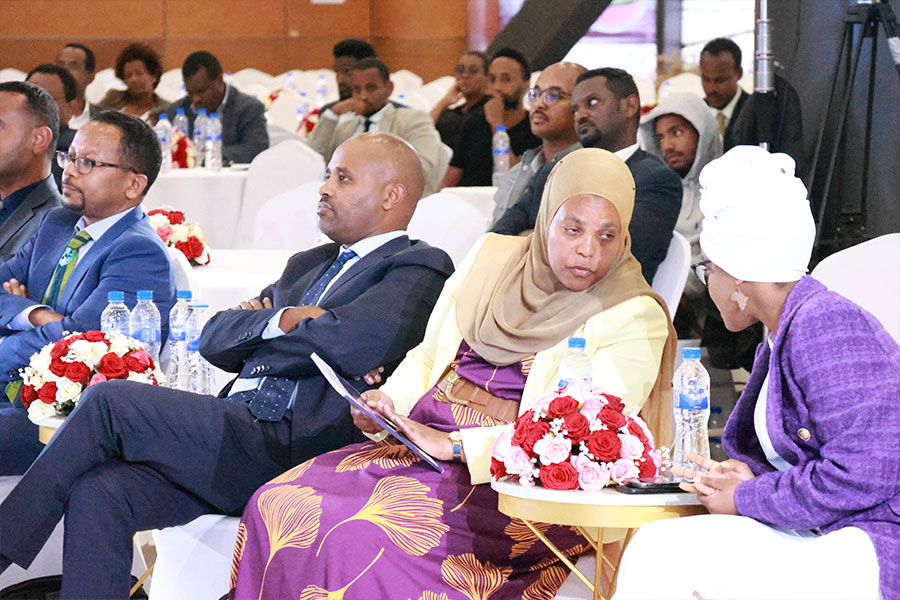
Radar | Aug 07,2021
Jun 5 , 2021
By Yehualashet Tamiru
The passing of the Federal Courts proclamation has brought substantive changes to Ethiopia's legal system. It has cleared up past inconsistencies but adds an ambiguity of its own, writes Yehualashet Tamiru Tegegn (yehuala5779@gmail.com), adjunct lecturer at Addis Abeba University and an associate at MTA.
It was back in January this year that parliament passed the Federal Courts proclamation. However, the publication of the proclamation was delayed for editorial issues. Nonetheless, it introduces various new changes that deserve deep reflection.
Primary amongst these is concerning the Federal Supreme Court Cassation Bench. The Ethiopian legal system contains four substantive codes, civil, criminal, commercial and maritime codes. It also encompasses two procedural codes: civil and criminal procedures.
This implies that decisions of the courts will not have a binding and precedential value to settle future related cases. The introduction of cassation decision with a binding legal force makes the Ethiopian legal system, nonetheless, a blend of common and continental legal system.
The Federal Supreme Court Cassation Division entertains only “basic and fundamental error of law.” One can infer two points from this: an error of fact and a minor error of law by the lower courts are not eligible for review by the grand one. However, there is no clear yardstick about what constitutes an issue of fact and law. Even worse, there are no criteria to distinguish basic and minor errors of law.
With the view to shed light on this, the new proclamation provides an illustrative list of grounds considered basic and fundamental error of law. Accordingly, any final judgment, ruling, order or decree which grossly distresses justice includes but is not limited to the violation of the constitution, denial of award judgement for justiciable matter, misinterpreting a legal provision, decision that is contrary to high public interest and national importance or applying an irrelevant law to the case.
These illustrative grounds of what constitutes fundamental error of law as per the new proclamation will create uncertainty, however. Take, for instance, a basic error of law that arises from the court denying an award judgment to justiciable matters. This article is drafted with the assumptions that defining justiciable matter is straightforward and not ambiguous. However, the term justiciable is not unambiguous and most of the controversies surrounding the matter the issue is arise out of the ambiguous of the word justiciable itself.
The other very vague and ambiguous wording in the list of the new proclamation is “if the decision is contrary to the law and has high public interest and national importance.”
The scope and content of public interest and national importance are unknown. Like that of public policy, coming up with public interest criteria is like riding a very unruly horse; when you get astride, you never known where it will carry you.
What is the meaning of “high public interest and national importance”? What is the difference between high public interest and average or normal public interest? Who is entitled to determine the existence and non-existence of high public interest in any given case? Is high public interest static, or does it fluctuate from time to time?
The proclamation fails to say.
Another issue is cassation over cassation. It is stated under the previous proclamation that the “interpretation of a law by the Federal Supreme Court rendered by the Cassation Division with not less than five judges shall be binding on Federal as well as regional council at all levels.”
This sweeping provision poses the most controversial constitutional issue: Cassation over Cassation. The main argument seems to have emerged from the very nature of federalism. Since the federal system of government envisaged under the Constitution allow state courts to provide a final decision for state matters and federal courts for federal matters, it will be unconstitutional for the Federal Supreme Court Cassation Bench to review a final decision by regional supreme court divisions
The new proclamation takes a drastic shift in this regard by curbing the power of the federal body to review regional cassation decisions only in restricted instances. This, at least, is commendable.
Yet another substantial change is the pecuniary jurisdiction of the Federal First Instance Court and Federal High Court. Under the old legal regime, the former is mandated to entertain cases that are not greater than half a million Birr and the latter was authorised to handle cases involving money greater than that. However, the new proclamation increases the pecuniary jurisdiction of the First Instance Court to 10 million Br.
No less critical is the introduction of court-annexed mediation (CAM). Among the cases that are to be heard by the First Instance and High Court shall be referred to CAM, the purpose of which is to increase access to justice for citizens and reduce case congestion.
Full and credit clause has likewise been introduced. This pertain to the recognition, acceptance and enforcement of the laws, orders, and judgments of another jurisdiction. The judgment receives the same effect in other sister states as in the region where it is entered. The absence of this doctrine was one of the legal predicaments that jeopardized the right of the citizen. However, the new proclamation indicated that the decisions or orders of the Federal Courts shall be executed within Ethiopia. Any government body or institution, non-government organization or person residing in any region shall have the obligation to execute or cause to be executed such decisions or orders.
The last but still significant change is the introduction of sort of amicus curiae - it is as a friend of the court, a passer-by who, when a judge is doubtful or mistaken, may inform the court. The Federal Supreme Court may establish an external advisory council composed of ex-judges of the Federal Courts, highly experienced and qualified legal professionals, and university professors that serve in the council for free. They, among other things, administer the court by providing non-binding recommendations.
PUBLISHED ON
Jun 05,2021 [ VOL
22 , NO
1101]

Radar | Aug 07,2021

Sunday with Eden | Aug 29,2020

Fortune News | Sep 09,2023

Fortune News | May 17,2025

Fortune News | Apr 09,2022

Sunday with Eden | Feb 20,2021

Commentaries | Oct 09,2021

Verbatim | Nov 23,2024

Agenda | Jan 14,2023

Viewpoints | Jul 27,2024

Photo Gallery | 175731 Views | May 06,2019

Photo Gallery | 165950 Views | Apr 26,2019

Photo Gallery | 156344 Views | Oct 06,2021

My Opinion | 136844 Views | Aug 14,2021

Dec 22 , 2024 . By TIZITA SHEWAFERAW
Charged with transforming colossal state-owned enterprises into modern and competitiv...

Aug 18 , 2024 . By AKSAH ITALO
Although predictable Yonas Zerihun's job in the ride-hailing service is not immune to...

Jul 28 , 2024 . By TIZITA SHEWAFERAW
Unhabitual, perhaps too many, Samuel Gebreyohannes, 38, used to occasionally enjoy a couple of beers at breakfast. However, he recently swit...

Jul 13 , 2024 . By AKSAH ITALO
Investors who rely on tractors, trucks, and field vehicles for commuting, transporting commodities, and f...

Oct 18 , 2025
The political establishment, notably the ruling party and its top brass, has become p...

Oct 11 , 2025
Ladislas Farago, a roving Associated Press (AP) correspondent, arrived in Ethiopia in...

Oct 4 , 2025
Eyob Tekalegn (PhD) had been in the Governor's chair for only weeks when, on Septembe...

Sep 27 , 2025
Four years into an experiment with “shock therapy” in education, the national moo...

Oct 18 , 2025 . By NAHOM AYELE
In a sweeping reform that upends nearly a decade of uniform health insurance contribu...

A bill that could transform the nutritional state sits in a limbo, even as the countr...

Oct 18 , 2025 . By SURAFEL MULUGETA
A long-planned directive to curb carbon emissions from fossil-fuel-powered vehicles h...

Oct 18 , 2025 . By BEZAWIT HULUAGER
Transaction advisors working with companies that hold over a quarter of a billion Bir...